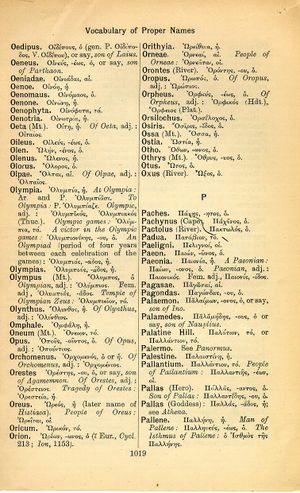Otus: Difference between revisions
From LSJ
πῶς δ' οὐκ ἀρίστη; τίς δ' ἐναντιώσεται; τί χρὴ γενέσθαι τὴν ὑπερβεβλημένην γυναῖκα; (Euripides' Alcestis 152-54) → How is she not noblest? Who will deny it? What must a woman have become to surpass her?
(Gf-D_6) |
m (Text replacement - "}}]]" to "}}]]") |
||
| Line 1: | Line 1: | ||
{{WoodhouseENELnames | {{WoodhouseENELnames | ||
|Text=[[File:woodhouse_1019.jpg|thumb | |Text=[[File:woodhouse_1019.jpg|thumb | ||
|link={{filepath:woodhouse_1019.jpg | |link={{filepath:woodhouse_1019.jpg}}]]Ὦτος, ὁ. | ||
}} | }} | ||
{{Lewis | {{Lewis | ||
Revision as of 10:07, 15 August 2017
English > Greek (Woodhouse)
Ὦτος, ὁ.
Latin > English (Lewis & Short)
Ōtus: (also Ōtos, Ōthos, and Oetus), i, m.,
I the name of a giant: immanis Otos, Verg. Cul. 233; cf. Hyg. Fab. 28.
Latin > French (Gaffiot 2016)
(2) Ōtus (-thus, -thos, Œtus), ī, m. (Ὤθος), nom d’un géant : Virg. Cul. 233 ; Hyg. Fab. 28 ; Amm. 22, 14, 3.

